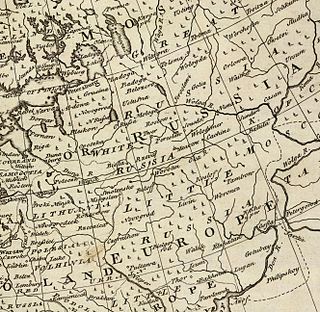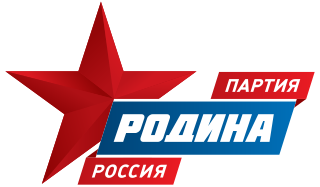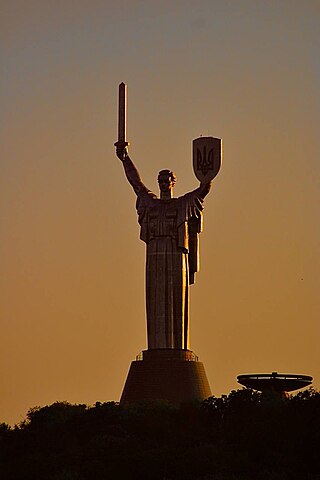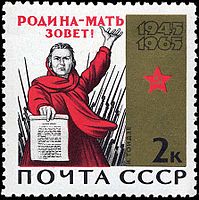
Little Russia, also known in English as Malorussia, Little Rus', Rus' Minor, and the French equivalent Petite Russie, is a geographical and historical term used to describe Ukraine. Since 1334, Yuri II Boleslav, the ruler of the Ruthenian Kingdom of Galicia–Volhynia, signed his decrees Natus dux totius Russiæ minoris, but the expression μικρὰ Ρωσσία is found as early as 1292, in the Byzantine writer Codinus. The distinction between "Great" and "Little" Rus' probably originated among Byzantine, Greek-speaking clerics who wanted to separate the two Ruthenian ecclesiastical metropolises of Halych and Moscow.

Mamayev Kurgan is a dominant height overlooking the city of Volgograd in Southern Russia. The name in Russian means "tumulus of Mamai". The formation is dominated by a memorial complex commemorating the Battle of Stalingrad. The battle, a hard-fought Soviet victory over Axis forces on the Eastern Front of World War II, turned into one of the bloodiest battles in human history. At the time of its installation in 1967 the statue, named The Motherland Calls, formed the largest free-standing sculpture in the world.

Mokosh is a Slavic goddess mentioned in the Primary Chronicle, protector of women's work and women's destiny. She watches over spinning and weaving, shearing of sheep, and protects women in childbirth. Mokosh is the Mother Goddess.

Lyube is a Russian nationalistic rock band from Lyubertsy, a city in Moscow Oblast. Lyube's music is a mixture of several genres, with influences from both Russian folk music, rock, Russian chanson, and Soviet military songs. The band was founded in 1989, and since then have released sixteen albums. Lyube's producer and main songwriter is Igor Matviyenko.

Yuri Yulianovich Shevchuk is a Soviet and Russian rock musician and singer/songwriter who leads the rock band DDT, which he founded with Vladimir Sigachyov in 1980.

The All-Russian Political Party "Rodina" is a nationalist political party in Russia. It was a coalition of thirty nationalist groups that was established by Dmitry Rogozin, Sergey Glazyev, Sergey Baburin, Viktor Gerashchenko, Georgy Shpak, Valentin Varennikov and others in August 2003. The party's ideology combines "patriotism, nationalism, and a greater role for the government in the economy", and is described as pro-Kremlin. Its headquarters is located in Moscow.

A Just Russia – For Truth, formerly A Just Russia (SR), also referred to as Fair Russia, is a social conservative and social-democratic political party in Russia. The party is considered to be part of the "systemic opposition", but is generally sympathetic to the agenda of incumbent president Vladimir Putin, including his foreign policy.

Volgograd International Airport is an airport located 15 km northwest of the city of Volgograd, formerly Stalingrad, in Russia. It comprises a civilian airport built on top of an older military runway, now demolished. The terminal area parks 42 medium/large aircraft and 91 small aircraft.
The Rossiya Bank is a Russian joint stock bank founded on June 27, 1990. The company's headquarters are in Saint Petersburg.

The Motherland Calls is the compositional centre of the monument-ensemble "Heroes of the Battle of Stalingrad" on Mamayev Kurgan in Volgograd, Russia. The statue is designed in the Soviet style of socialist realism. It was created by sculptor Yevgeny Vuchetich and structural engineer Nikolai Nikitin, and declared the tallest statue in the world in 1967. At 85 m (279 ft), it is the tallest statue in the eastern hemisphere outside of Asia.

Mother Ukraine is a monumental Soviet-era statue in Kyiv, the capital of Ukraine. The sculpture is a part of the National Museum of the History of Ukraine in the Second World War. In 2023, the Soviet heraldry was removed from the monument's shield and replaced with Ukraine's coat of arms, the tryzub.
Turks in Russia, also referred to as Turkish Russians or Russian Turks, refers to people of full or partial ethnic Turkish origin who have either immigrated to Russia or who were born in the Russian state. The community is largely made up of several migration waves, including: descendants of Ottoman-Turkish captives during the Russo-Turkish wars; the Turkish Meskhetian community; and the more recent Turkish immigrants from the Republic of Turkey.
Aleksandr Kharchikov was a Russian folk singer-songwriter noted for his controversial songs of Stalinist, nationalist, anti-Ukrainian and antisemitic nature. He is considered a hero and patriot by Nazbol and neo-Stalinist groups in Russia.

The Other Russia of E. V. Limonov, formerly The Other Russia, is an unregistered National Bolshevik political party in Russia, founded on 10 July 2010 by Eduard Limonov. The Other Russia was reorganized in September 2020 and changed its name to "The Other Russia of E. V. Limonov", in honor of their deceased founder who had died the same year. As a Russian political party adopting syncretic politics, it has been variously called far-left and far-right by the likes of Malaysia's The Sun, France's Le Point, and BFM TV, Belgian's RTBF, and Eurasia Daily Monitor and the Czech Republic's Expactz.cz, respectively.

"Arise, Russian People!" Is a patriotic song from the Soviet film "Alexander Nevsky" (1938) directed by Sergei Eisenstein. The music is composed by Sergei Prokofiev, with lyricist Vladimir Lugovskoy.
The year 1967 was marked by many events that left an imprint on the history of Soviet and Russian Fine Arts.
The year 1985 was marked by many events that left an imprint on the history of Soviet and Russian Fine Arts.

The Monument "Motherland" Matveev Kurgan is a Russian monument located near the village of Starorotovka.
The 2020–21 Russian Cup was the 29th season of the Russian football knockout tournament since the dissolution of the Soviet Union. The competition started on 5 August 2020 and concluded on 12 May 2021.
True Russia is a charity opposed to 2022 Russian invasion of Ukraine by uniting people of Russian culture around the world in their will to support the victims. It was founded by writer Boris Akunin, dancer Mikhail Baryshnikov and economist Sergei Guriev. The project is dedicated to helping Ukrainian refugees, as well as people who were forced to leave Russia after the Russian invasion of Ukraine. The project's website emphasizes that it is not a political movement and not affiliated with any party or politician.
![A cover of Sentry [ru] magazine, approx. 1932, depicting Russia as a woman in a traditional costume liberated by a warrior in medieval armor with a shield depicting the National russian, trampling the Communist flag. Thecristisrizenoldrussiancivilwarposter.jpg](http://upload.wikimedia.org/wikipedia/commons/thumb/0/0e/Thecristisrizenoldrussiancivilwarposter.jpg/220px-Thecristisrizenoldrussiancivilwarposter.jpg)














